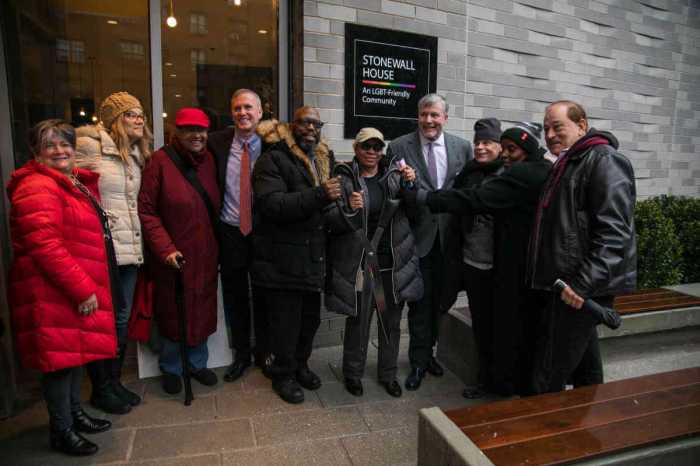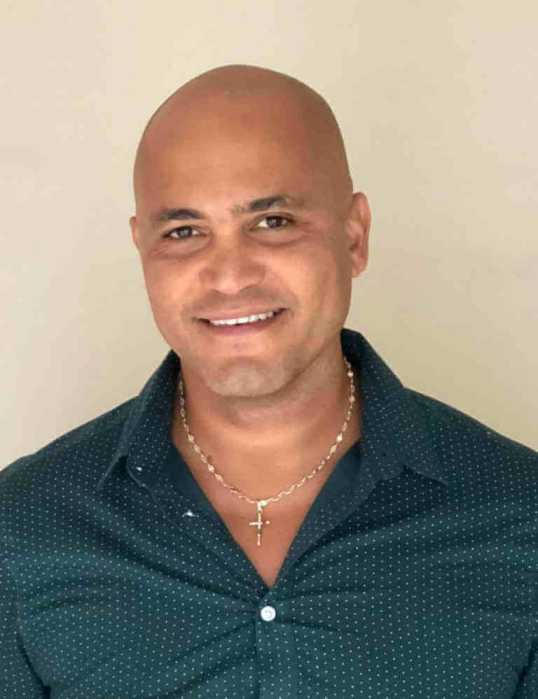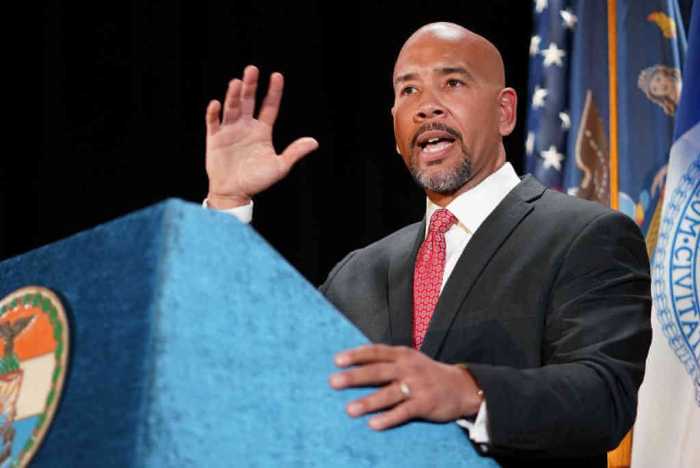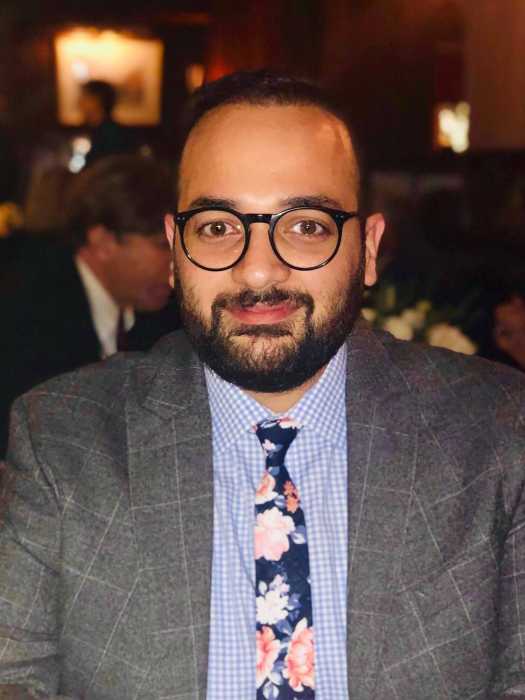The SAGE contingent in last Sunday's Pride March in Manhattan emphasized the commitment to reverse the Trump's administration's plan to eliminate transgender elders from an annual survey of older Americans. | DONNA ACETO
With less than a month left before the federal Department of Health and Human Services (DHHS) closes the window on public comment, advocates for LGBTQ seniors are claiming partial victory against the Trump administration’s original plan to “erase” the community’s elders from an annual government survey of older Americans.
According to Services and Advocacy for GLBT Elders, or SAGE, at the conclusion of a preliminary 60-day public comment period, the federal Administration on Aging, a unit of the Administration for Community Living within DHHS, published a revised survey format that restores a question about sexual orientation it originally proposed jettisoning.
However, the agency is continuing with its plan to drop a separate question about gender identity.
Under the Obama administration, the survey included questions on both sexual orientation and gender identity in 2014, 2015, and 2016.
According to Michael Adams, SAGE’s CEO, the National Survey of Older Americans Act Participants is a critical tool for making the needs of older Americans known to legislators and other policymakers.
In an interview with Gay City News earlier this year when DHHS first proposed the elimination of both sexual orientation and gender identity from the survey, he said of the Obama policy of counting LGBTQ seniors, “The most important impact was in sending a message to federally-funded elder care providers that this was a segment that had to be served. We saw positive results as a consequence.”
On June 30, Adams — a week after learning that the initial comment period resulted in DHHS reversing its intentions on surveying sexual orientation but not gender identity — told this newspaper, “We want to recognize that we won a significant victory here but we can’t let up. We don't know if we can reverse them on transgender seniors but we have to fight like hell.”
SAGE's Michael Adams at the June 16 Pride Rally in Foley Square. | DONNA ACETO
In April, when SAGE and other senior advocates first learned of DHHS’ intention to modify the survey, the group waged a dramatic public campaign with the slogan: “TRUMP TO LGBT ELDERS: DROP DEAD,” playing off the famous Daily News front page castigating President Gerald Ford’s refusal to bail out New York City during the height of the 1970s fiscal crisis. SAGE also emphasized in its advertising, “We refuse to be invisible.”
Directing concerned community members to its website at sageusa.org, the group reports that roughly 9,500 people offered comments to the federal government through a link provided there.
In total, Adams said, roughly 15,000 people voiced their opposition to the elimination of sexual orientation and gender identity categories on the survey during the 60-day comment period. The public now has until July 22 to offer comment on the revised survey format, and SAGE will continue to direct those interested in voicing their views through its website.
“What we have seen is that opposition and public comment can have an effect,” Adams said, noting that the opposition included leading expert voices in the aging community.
Press scrutiny, he said, forced DHHS to justify its intentions, which Adams said are based on little more than “bigotry.” In response to a query from the Associated Press, he said, administration officials initially said the use of the sexual orientation and gender identity categories was simply a three-year pilot program that was due to expire.
When former DHHS officials who developed the questions contradicted that assertion, the Trump administration responded that including the two categories imposed burdensome costs on state and local officials required to collect the information.
That, in turn, Adams said, led officials around the country to come forward to say they found the information valuable and were not burdened in accumulating it.
“Negative media attention forced them to explain,” Adams said of what DHHS officials faced over the past several months. “And then we could respond. The press smoked them out.”
The controversy also caught the attention of Congress and led to bipartisan support for keeping both the sexual orientation and gender identity questions in the survey. Maine Republican Senator Susan Collins, who chairs the Special Committee on Aging, and the committee’s ranking Democrat, Bob Casey of Pennsylvania, got 17 of their colleagues to sign on to a letter opposing the DHHS plan to forgo questions about sexual orientation and gender identity.
SAGE’s April campaign to block the federal Administration on Aging from deleting the LGBTQ community from its annual survey. | SAGEUSA.ORG
In an email circulated to SAGE supporters this past week, Adams pledged, “Over these 30 days, SAGE intends to fight as aggressively against the erasure of trans elders as we fought against the erasure of LGBT elders. We will not rest until all of our community’s elders are counted, included, and supported. Thousands of voices of opposition forced the Trump Administration to back down on LGB elder erasure; thousands more will be needed to force them to back down on trans erasure.”
Once DHHS makes it final determination on the specifics of the annual senior survey, it must get approval from the White House Office of Management and Budget.
In discussing the specifics of why the Obama administration’s inclusion of the LGBTQ community in that survey was so significant, Adams told Gay City News, “We saw state offices on aging and area offices on aging stepping up and doing needs assessment and designing programs to serve our community. Of course not everywhere, but in a growing number of places including in places we wouldn’t have expected.”
Noting that the federal government is the largest funder of elder services across the nation, he added, “Our fear is that this disregard will cascade down to state and local governments.”
For more information on SAGE’s efforts to forestall the elimination of transgender seniors from the federal government’s annual survey, visit sageusa.org.








































